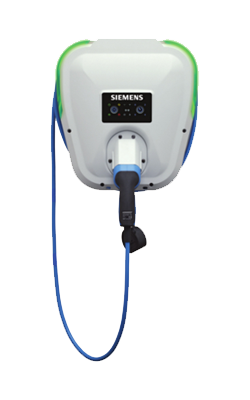ELECTRIC VEHICLE CHARGING: TIME, COST & RANGE
การชาร์จรถยนต์ไฟฟ้า: เวลา ค่าใช้จ่าย และช่วง
เครื่องชาร์จรถยนต์ไฟฟ้า SIEMENS – EV charger แบรนด์ชั้นนำของเยอรมันนี ยอดขายอันดับ. การชาร์จยานยนต์ไฟฟ้าใช้เวลานานแค่ไหน? , ค่าใช้จ่ายในการชาร์จยานยนต์ไฟฟ้าอยู่ที่เท่าไหร่?, EV ของคุณใช้พลังงานแบตเตอรี่เท่าใด?
February 25, 2023
Electric vehicles
Hybrid electric, Plug-in hybrid electric, and fully electric vehicles reduce carbon emissions. They make use of electrical energy stored in a rechargeable battery. A fully Electric Vehicle (EV) has zero tailpipe emissions. You can drive an EV without a noisy combustion engine.
EVs have a shorter range compared to petrol or diesel vehicles. Regenerative braking—the electrical system feeds electrical energy back to the battery when slowing or braking—helps an EV to replenish (somewhat) the energy. An EV provides information to the driver, about its battery capacity and predicted range. If the battery runs out of charge an EV will stop.
EV charging
An EV supports slow, fast, and rapid charging. EVs come with a cable (either Type 1 or Type 2), so; you have the convenience of home charging.

To increase charging speed, you need to install a charging point at home. Siemen Versicharge 7.2 kW home charger is faster than using a regular home socket. Public DC chargers convert AC to DC and use DC to charge the battery. Siemens SiCharge D fast charging stations deliver up to 300 kW, and they charge your EV up to 80% in less than one hour at public charging stations, if there is a compatible connector.
How long do I have to charge?
Charging time depends on many factors—actual charging power, EV’s onboard electrical system, battery capacity, driving style, etc.
e.g., MG ZS EV, 44.5 kWh ÷ 7.2 kW ~ 6h
How much does it cost to charge an EV?
Charging cost depends on many factors—driving distance, electricity tariff, household electricity consumption, weather conditions, weight, A/C, battery capacity, etc.
If you have a big enough solar PV system, it could be free!
e.g., MG ZS EV,
3.71 THB X 44.5 kWh ~ 165.10 THB
(4.22 THB X 44.5 kWh) + 16.43 THB ~ 204.22 THB
(electricity Tariff January 2023 onwards, Bangkok)
50.00 LKR X 44.5 kWh ~ 2,225.00 LKR
(75.00 LKR X 44.5 kWh) + 500.00 LKR ~ 3,837.50 LKR
(Electricity Tariff Revision 2023, Sri Lanka)
How much battery power, does your EV consume?
MG says, MG ZS EV, can range up to 263 km from a single charge; under the Worldwide Harmonised Light Vehicle Test Procedure (WLTP). FOMM Corporation says Fomm ONE's cruising distance is 166 km, according to the New European Driving Cycle (NEDC). BMW says, the BMW i3 is a battery-electric vehicle, and its electric range (tested after the battery had been fully charged) in miles (WLTP) is 182-190. Hyundai Motor says IONIQ Electric offers a range of up to 194 miles.
| Vehicle |  |
 |
Cable | Wall Plug | VersiCharge Gen 2 | VersiCharge Gen 3 | SiCharge D |
|---|---|---|---|---|---|---|---|
| MG ZS EV | 44.5 kWh | 7.2 kW | Type 2 | 2.3 kW (18h+) | 7.2 kW (6h) | 22.0 kW (6h) | 160 kW (30m) |
| Nissan Leaf (2021) | 40.0 kWh | 3.6 kW | Type 1 | 2.3 kW (20h+) | 7.2 kW (11h) | 22.0 kW (11h) | - |
| Hyundai IONIQ Electric | 38.3 kWh | 7.2 kW | Type 2 | 2.3 kW (12h) | 7.2 kW (6h) | 22.0 kW (6h) | 160 kW (30m) |
| Audi e-tron 55 quattro | 95.0 kWh | 11.0 kW | Type 2 | 2.3 kW (20h+) | 7.2 kW (12h) | 22.0 kW (4h 30m) | 160 kW (45m) |
| Fomm ONE | 12.0 kWh | 7.2 kW | Type 2 | 2.3 kW (7h 30m) | 7.2 kW (6h) | 22.0 kW (6h) | 160 kW (20m) |
| BYD E6 | 80.0 kWh | 11 kW | Type 2 | 2.3 kW (20h+) | 7.2 kW (11h) | 22.0 kW (7h) | 160 kW (2h) |
| BMW i3 | 33.0 kWh | 11 kW | Type 2 | 2.3 kW (14h) | 7.2 kW (4 h 30m) | 22.0 kW (3h) | 160 kW (20m) |
| BMW 530e ELITE Plug-in Hybrid | 12.0 kWh | 3.6 kW | Type 2 | 2.3 kW (6h) | 7.2 kW (3h 15m) | 22.0 kW (3h 15m) | - |
| BMINI Cooper SE | 32.6 kWh | 11 kW | Type 2 | 2.3 kW (6h) | 7.2 kW (4h 40 m) | 22.0 kW (3h) | 160.0 kW (30m) |
- Siemen VersiCharge Gen 2 (7.2 kW / 30 A) single phase.
- Siemen Versicharge Gen 3 (22 kW / 30 A) 3 phase.
- Siemen SiCharge D (160 kW - 300 kW / 125 A - 500 A)

Home | Contact: info@gazersdigest.com
© 2020-2025 Gazer’s Digest is an information sharing platform. Gazer’s Digest includes topics, thought to be useful for the readers.








